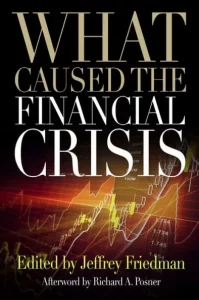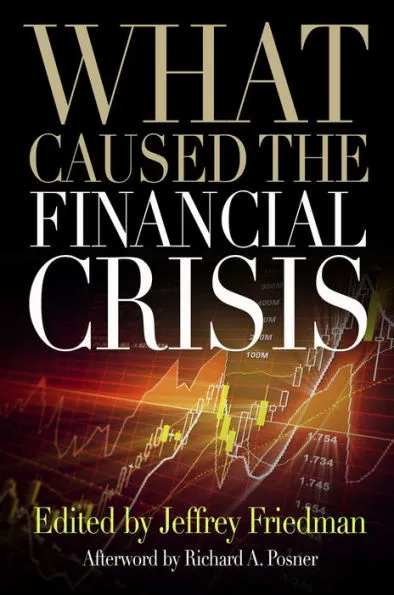
I learned yesterday that Jeffrey Friedman died on December 2 at age 63. He was a very smart and thoughtful person who definitely marched to the beat of his own drummer. For example, he questioned certain standard libertarian arguments in a way that few others had done.
Probably my favorite work by him it his edited 2011 volume, What Caused the Financial Crisis. His 66-page opening chapter, “Capitalism and the Crisis: Bankers, Bonuses, Ideology, and Ignorance,” is first-rate. It’s full of stunning important facts that I had not been aware of.
Here’s one:
In 1999, the SEC infamously penalized SunTrust Bank for keeping “excessive” loan-loss reserves, on the grounds that this “could be used to make earnings look less volatile” (Hopkins 2009). Since then, banks have avoided building up reserves when times are good because of the SEC’s power to harass and penalize them if they do (Isaac 2009), 11; Rieker 2009). Banking analysts point out that:
in a long period of benign economic conditions, it becomes difficult to use acceptable documentation based on history and recent experience to justify significant [loan-loss] provisioning. Thus, when bankers were unable to produce acceptable documentation . . . auditors began to lean on them to reduce provisions or even take the more extreme step of reducing reserves. The result . . . was that the industry went into the current downturn without adequate reserves to absorb the wave of loan losses now being recognized. (Wolters Kluwer 2009)
I drew on his introduction later in 2011 in a presentation I gave at the Mont Pelerin Society’s regional meeting in Istanbul.
I wrote:
Jeff Friedman points out that when regulators impose rules, the people they regulate must follow them and that, therefore, the rules homogenize behavior and prevent diversity. The advantage of diversity is that not all participants will walk off the cliff. Wells Fargo Bank, J.P. Morgan, and Goldman Sachs, for example, all became aware of the risks of mortgage-backed securities and took actions to reduce or hedge their risks. Had regulation been even tighter, this would have been impossible. However heterogeneous are regulators’ opinions of a regulation, notes Friedman, only one regulation becomes law. Diversity among market participants, by contrast, “takes the more concrete form of different enterprises structured by different theories.”
For the reason above, whatever caused the financial crisis, the solution is not more regulation. Why? Friedman says it best:
[W]here there are competing powers, as in a capitalist economy, there is more chance of heterogeneity than when there is a single regulator with power over all the competitors. At worst, in the limit case of a market that, through herd behavior, completely converged on an erroneous idea or practice, unregulated capitalism would likely be no worse than regulated capitalism, since an idea or practice that is homogeneously accepted by all market participants in a given time and place is likely to be accepted by the regulators of that time and place, too. But at best, competing businesses will embody different theories, with the bad ones tending to be weeded out.
I first met Jeff, by the way, in April 1979 at Brown University when he was an undergrad and I was an assistant professor of economics at the University of Rochester. He had invited me to debate Donald J. Eberly, one of the main advocates of a compulsory national service draft. Eberly was the author of the national service provisions of the McCloskey bill, named after maverick Bay Area Republican Congressman Pete McCloskey.


READER COMMENTS
Eric Charles
Dec 6 2022 at 10:26am
His essay critical on Libertarianism is also a masterpiece. Some quotes:
“Is it just amazing good fortune that the armchair philosopher, reflecting on the different forms of individual ownership and on the metaphysics of labor mixing, reaches the same conclusion (libertarianism) as the economist studying the effects of minimum wage laws and the causes of business cycles, the sociologist investigating the war on drugs, and the political scientist probing the rationality of democratic decision making? Divine intervention might seem to be the only thing that could make sense of this libertarian straddle: the notion that one need not choose between a priori and a posteriori rationales for a libertarian world (although, if one had to choose, one would choose the a priori rationale), because such a world would be the best possible world in every respect.
“The orthodox libertarian schema implies that these consequentialist arguments are superfluous. They are essentially propaganda devices, designed to convince nonlibertarians to reach libertarian conclusions for the wrong reasons.”
“Thus the libertarian dilemma Libertarian philosophy is self sustaining if one accepts its premises, but one would only accept them if one had already been pushed in a libertarian direction by consequentialist considerations. Yet consequences are irrelevant once philosophical premises are are accepted Libertarianism philosophy repudiates social science, but it needs social science if it is to be persuasive”
“The libertarian appeal to negative liberty is entirely parasitic on the appeal to Lockean property rights, but the appeal to Lockean property rights is entirely undefended. This raises the question of what makes libertarians so confident that they can stake their case on philosophical grounds.”
David Henderson
Dec 6 2022 at 2:04pm
This is a nice statement of Jeff’s key point about libertarianism.
It’s also one that I don’t find nearly as troubling as he did. I think anyone who has principles that he wants to see implemented in the world owes it to himself and others to see what consequences following those principles would lead to. So a case based both on principle and on consequences is one that I don’t find troubling.
robc
Dec 6 2022 at 11:32am
Disagree, as I don’t buy Lockean property rights. The rest of natural law, sure, but not property rights. I support property rights for reasons I got from Mises and George…its a useful fiction.
Eric Charles
Dec 6 2022 at 1:32pm
“Disagree, as I don’t buy Lockean property rights. The rest of natural law, sure, but not property rights. I support property rights for reasons I got from Mises and George…its a useful fiction.”
He was addressing Rand and Rothbard in this passage and others who appeal to non economic reasoning when it comes to property rights. “Useful friction” sounds like economic reasoning so Friedman would not object if that is the sole justification for property rights.
Comments are closed.